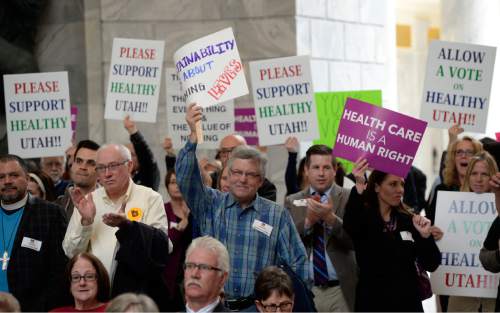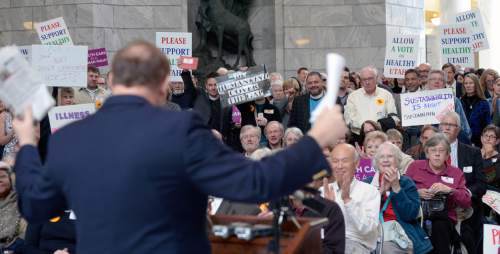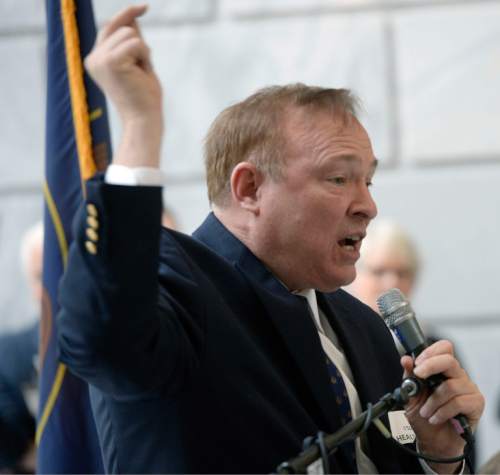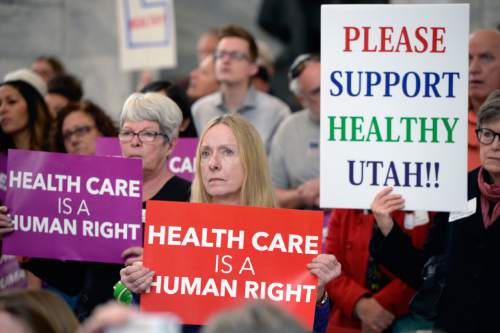This is an archived article that was published on sltrib.com in 2015, and information in the article may be outdated. It is provided only for personal research purposes and may not be reprinted.
A new poll of Utah voters finds lackluster support for the Utah House's proposed Medicaid expansion, Utah Cares, but continued strong support for Gov. Gary Herbert's Healthy Utah plan.
Head-to-head, Utah Cares was the clear loser, with 18 percent of those surveyed by a nonpartisan research center at Brigham Young University saying they prefer Utah Cares, and 82 percent prefer Healthy Utah.
The online survey was conducted March 18-26 by The Center for the Study of Elections and Democracy at BYU.
The center periodically does online surveys of people who were recruited at polling places during elections beginning in 2004.
House Speaker Greg Hughes put little stock in the survey and on Tuesday called the survey question factually inaccurate in its description of who the plans would cover and how much funding they would receive from the federal government.
"I have always said I'd like to see the question that reflects the complexity of the issue," Hughes said. "It's a tough issue because it's so wonkish."
Utah Cares was proposed by House Majority Leader Jim Dunnigan, R-Taylorsville, in the waning days of the 2015 legislative session after his House colleagues rejected the governor's plan to provide health insurance for poor Utahns.
The Senate had voted for Healthy Utah, but Utah Cares was pitched as a more realistic and sustainable option, given a pending Supreme Court decision on the Affordable Care Act's tax subsidies and the fact the Obama administration will be gone in 2017.
Unable to negotiate a compromise in the session's busy final hours, the governor and legislative leaders held a news conference to announce a mutual promise: Herbert, Lt. Gov. Spencer Cox, House Speaker Greg Hughes, Senate President Wayne Niederhauser and the two bills' sponsors — Sen. Brian Shiozawa and Dunnigan — will come up with a compromise.
They plan to do so by the end of July, with a special session of the Legislature called later in the summer or early fall to consider a plan.
Herbert's spokesman, Marty Carpenter, had no comment on the poll results Tuesday, and said only that Herbert "is determined to work with the bill sponsors and leadership to find a path forward to address the issue."
The group of six is expected to begin meeting soon.
Hughes said they likely will travel to Washington together to meet with the U.S. Department of Health and Human Services to seek more concessions.
Healthy Utah was the result of months of negotiations last year between Herbert's administration and the federal health agency.
The BYU survey asked participants all kinds of questions, such as their opinion of the tea party and legislative action on anti-discrimination, medicinal marijuana, gas tax hikes and air quality. It also asked participants their level of approval of the governor, the Legislature, Hughes and Utah's two U.S. senators.
But it was the first survey to pose questions about both Healthy Utah and Utah Cares. Surveys taken last year consistently found public support for Healthy Utah.
According to a release from the BYU center, 1,157 completed the online survey out of the 9,576 who were asked to participate. The margin of error was almost 3 percent.
While 35 percent said they strongly support and 36 percent said they somewhat support Healthy Utah, only 2 percent said they strongly support and 22 percent said they somewhat support Utah Cares.
The background that prefaced the questions was phrased like this: "Over the course of the legislative session, two major Medicaid expansion bills were discussed: Healthy Utah and Utah Cares. Healthy Utah would cover approximately 126,000 Utahns. It would cost the state about $25 million over the course of the plan, and would include about $1 billion in funding from the federal government.
"Utah Cares would cover approximately 60,000 Utahns. It would cost the state about $65 million over the course of the plan, and would include about $200 million in funding from the federal government."
Hughes noted Tuesday that he wouldn't have supported Utah Cares either if it were as described in the poll.
"The premise of that question begs the answer you received," he said.
Hughes disputed both the numbers of those covered and the federal contribution, and says both plans would cover the same number of people. Utah Cares would accomplish that by leaving those at poverty level income to 138 percent of poverty where they are now — getting subsidized insurance via the federal marketplace.
The survey question, he said, "leaves the impression we've left people uncovered and that's not the case," Hughes said.
The governor's advisers said during the session that Healthy Utah would bring back $1 billion to the state from the feds over the two years of the plan, and that Utah Cares would bring back $195 million.
Hughes said Tuesday that the House's analysts projected a smaller gap: $648 million in federal money with Healthy Utah and $269 million with Utah Cares.
Jeremy Pope, co-director of the BYU center, said the numbers in the question were provided by state government officials.
"Any question about such a complex policy issue is going to fail to please some people. This is both because government scoring of complicated legislation will always be a point of debate, and also because no survey question can contain all of the different information possible on a subject," he said.
No survey question should ever be taken as the final word on a subject, Pope wrote in an email. "Public opinion should always be judged in light of multiple surveys and multiple ways of asking questions."
Twitter: @KristenMoulton









